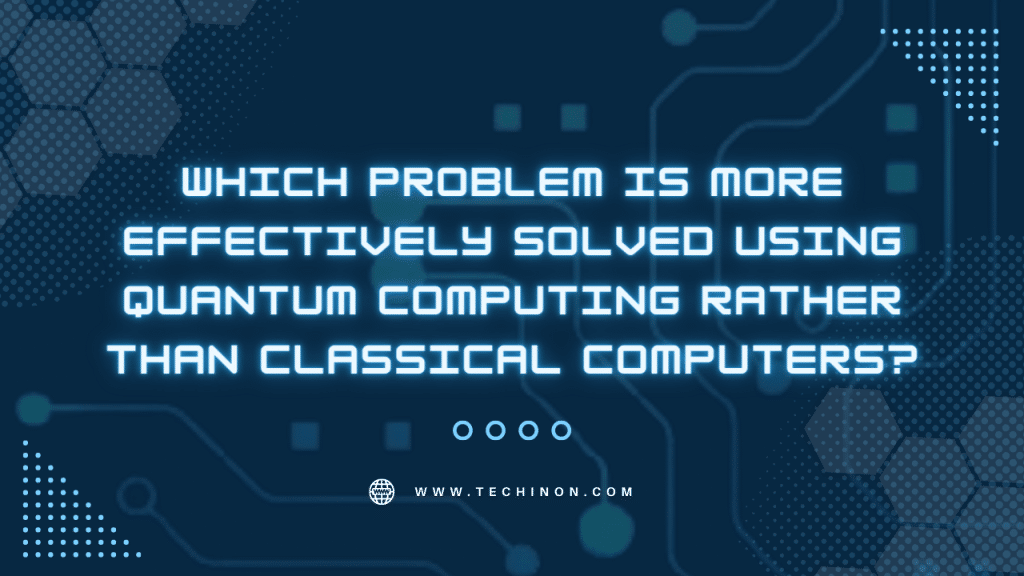In the ever-evolving landscape of technology, quantum computing emerges as a dazzling star, promising to reshape the very fabric of problem-solving capabilities. As classical computers face limitations in tackling increasingly complex problems, quantum computing steps in with a remarkable potential to provide solutions that were once deemed unattainable. In this article, we delve into the world of quantum computing and explore which problem is more effectively solved using quantum computing rather than classical computers?
Quantum Algorithms: Redefining Possibilities
Imagine solving optimization problems like finding the most efficient routes for delivery fleets or optimizing financial portfolios with incredible speed. Quantum algorithms exploit a phenomenon called quantum parallelism, where qubits can exist in multiple states simultaneously. This enables quantum computers to explore vast solution spaces concurrently, providing exponential speedup for optimization challenges that could take classical computers eons to solve.
Quantum Supremacy and Beyond
Shor’s algorithm, a quantum breakthrough, threatens classical cryptography by efficiently factoring large numbers—essential for encryption. Classical computers struggle with this, but quantum computers have the potential to decipher encrypted information at an astonishing pace. However, this also raises concerns about data security, prompting the need for quantum-safe cryptographic solutions.
Real-World Applications of Quantum Algorithms
The impact of quantum algorithms transcends theoretical realms. From drug discovery, weather forecasting, and supply chain optimization to AI-enhanced machine learning, quantum computing holds promise for industries seeking exponential speedup in data-intensive tasks. It’s not just about solving problems faster—it’s about solving problems once thought unsolvable.
Quantum Parallelism Unveiled
Quantum parallelism is the quantum magician’s wand that empowers qubits to explore multiple solutions concurrently. While classical bits must choose between 0 and 1, qubits can exist in both states at once. This intrinsic parallelism revolutionizes problem-solving, allowing quantum computers to process vast datasets in a fraction of the time it would take classical counterparts.
Shor’s Algorithm: Reshaping Cryptography
Shor’s algorithm threatens classical cryptography by factoring large numbers exponentially faster. This means the foundation of modern encryption could crumble in the face of a quantum attack. However, researchers are racing to develop quantum-resistant encryption methods, ensuring data security in the quantum era.
Quantum Algorithms in Machine Learning
Quantum machine learning marries the computational prowess of quantum computing with the intelligence of machine learning. Algorithms like the Quantum Support Vector Machine and Quantum Neural Networks hold the promise of accelerating AI training, opening doors to innovative applications such as personalized medicine and autonomous systems.
Simulating Quantum Systems with Precision
Quantum systems are inherently complex, often defying classical simulation due to their entangled and superpositioned nature. Quantum computers, however, are uniquely equipped to simulate quantum systems accurately. This capability is a game-changer for understanding molecular interactions, material properties, and even discovering novel drugs.
Harnessing Quantum Entanglement
Entanglement, a seemingly mystical connection between qubits, is a cornerstone of quantum computing. Qubits entangled across space can instantaneously affect each other, enabling quantum computers to process information in profoundly interconnected ways. This phenomenon holds the key to unlocking novel problem-solving strategies.
Quantum Error Correction: Ensuring Reliability
Quantum computers aren’t immune to errors caused by external interference or decoherence—the loss of quantum information. Quantum error correction codes, inspired by classical error correction, detect and correct errors to maintain the integrity of computations. These codes are vital to realizing the full potential of quantum computing.
Embracing Quantum Speedup
While quantum computers exhibit remarkable speedup for specific problems, they’re not omnipotent. Certain problems, like simple linear algebra calculations, might not benefit from quantum acceleration. Recognizing these limitations is crucial for effective problem selection when harnessing quantum computing’s power.
Quantum Computing’s Scientific Odyssey
Quantum computing’s potential to revolutionize scientific research is awe-inspiring. It can simulate complex quantum phenomena, model molecular interactions, and explore fundamental physics questions. With quantum computers as tools, scientists are poised to explore uncharted territories, making breakthroughs that reshape our understanding of the universe.
Gate-Based vs. Annealing-Based Quantum Computers
Gate-based and annealing-based quantum computers are two prominent architectures vying for supremacy. Gate-based computers use quantum gates to manipulate qubits, allowing versatile computations. Annealing-based computers, like those by D-Wave, focus on optimization problems by mimicking natural annealing processes. Both approaches have unique strengths, offering diverse solutions for different problem domains.
Exponential Speedup: A Quantum Leap
Yes, indeed. Problems like factoring large numbers, optimizing complex systems, and simulating quantum dynamics exhibit exponential speedup on quantum computers. This means tasks that were previously insurmountable for classical computers can now be tackled swiftly and efficiently.
Unraveling Combinatorial Optimization
Combinatorial optimization problems, prevalent in logistics, finance, and beyond, involve sifting through countless possibilities to find the best solution. Quantum annealing, a specialized quantum computing approach, excels at solving such problems by leveraging quantum tunneling and entanglement. This marks a significant stride towards solving practical challenges with extraordinary efficiency.
Quantum Supremacy: On the Horizon
Quantum supremacy, the point at which quantum computers outperform classical supercomputers, promises a paradigm shift. It opens doors to solving complex quantum chemistry problems, optimizing intricate systems, and advancing artificial intelligence. Quantum supremacy heralds a new era where what was once the realm of science fiction becomes reality.
Transforming Drug Discovery and Beyond
Absolutely. Quantum computers excel at simulating molecular interactions, accelerating drug discovery by exploring vast chemical spaces. This holds the potential to revolutionize medicine, enabling tailored treatments and quicker identification of promising drug candidates. Quantum computing becomes a catalyst for transforming healthcare and saving lives.
Empowering AI with Quantum Algorithms
Quantum algorithms inject a dose of superpower into AI and machine learning. They accelerate training of complex models, tackle optimization challenges in AI architectures, and improve pattern recognition. The synergy between quantum computing and AI leads to smarter, faster, and more efficient learning systems.
Navigating Quantum Cryptography Risks
Quantum cryptography promises unhackable communication through principles like quantum key distribution. However, quantum computers could potentially crack existing cryptographic systems, posing security risks.
Quantum Computing’s Current Landscape
As of now, quantum computing is in its nascent stages but progressing rapidly. Companies like IBM, Google, and Rigetti have developed quantum processors with a limited number of qubits. While these machines are susceptible to errors due to quantum decoherence, researchers are actively working on quantum error correction techniques to enhance reliability. Quantum computers are gradually becoming more accessible through cloud-based platforms, enabling researchers worldwide to experiment and contribute to the field’s advancement.
Decoherence: Taming Quantum Instability
Decoherence, the phenomenon where quantum states degrade due to interactions with the environment, is a significant challenge in quantum computing. Researchers employ techniques like quantum error correction and quantum annealing to mitigate the effects of decoherence. By encoding information redundantly and leveraging entanglement, they’re striving to extend the lifespan of quantum information, making quantum computations more robust.
Ethics and the Quantum Future
With great power comes great responsibility. Quantum computing’s potential to disrupt cryptography raises ethical concerns about data privacy and security. Ensuring a balance between quantum advances and safeguarding sensitive information becomes paramount. Additionally, questions regarding the environmental impact of quantum computing, given its extreme cooling requirements, need to be addressed as the technology scales.
Collaborative Quantum Endeavors
Quantum computing’s complexity demands interdisciplinary collaboration. Researchers, computer scientists, physicists, and mathematicians converge to develop quantum algorithms, error correction methods, and hardware solutions. Industries are partnering with academic institutions to harness quantum capabilities, aiming to accelerate innovation across sectors such as finance, healthcare, and logistics.
Quantum Computing’s Promising Trajectory
The future brims with excitement and possibilities. As quantum hardware advances, more complex problems will yield to its computational prowess. Quantum supremacy will be an inflection point, driving innovation and revealing solutions that were previously shrouded. Quantum machine learning will fuel smarter AI systems, and quantum cryptography will usher in a new era of secure communication. It’s a journey of transformation, innovation, and exploration.
Also Read: Which Situation is a Current Example of a Use Case in Quantum Computing?
Conclusion: The Quantum Dawn
Quantum computing stands at the cusp of revolutionizing problem-solving on an unprecedented scale. It’s not just about solving problems faster—it’s about rewriting the rules of computation. From optimizing supply chains to decrypting secrets hidden within encryption codes, quantum computing’s potential knows no bounds. While challenges like decoherence and ethical considerations pave the path ahead, the collective efforts of researchers, industries, and visionaries paint a picture of a future where quantum computers unlock solutions we once could only dream of.
To conclude, our aim with this article on “Which Problem is More Effectively Solved Using Quantum Computing Rather Than Classical Computers?” has been to equip you with the necessary tools and knowledge to make informed decisions and overcome any challenges you may encounter.

